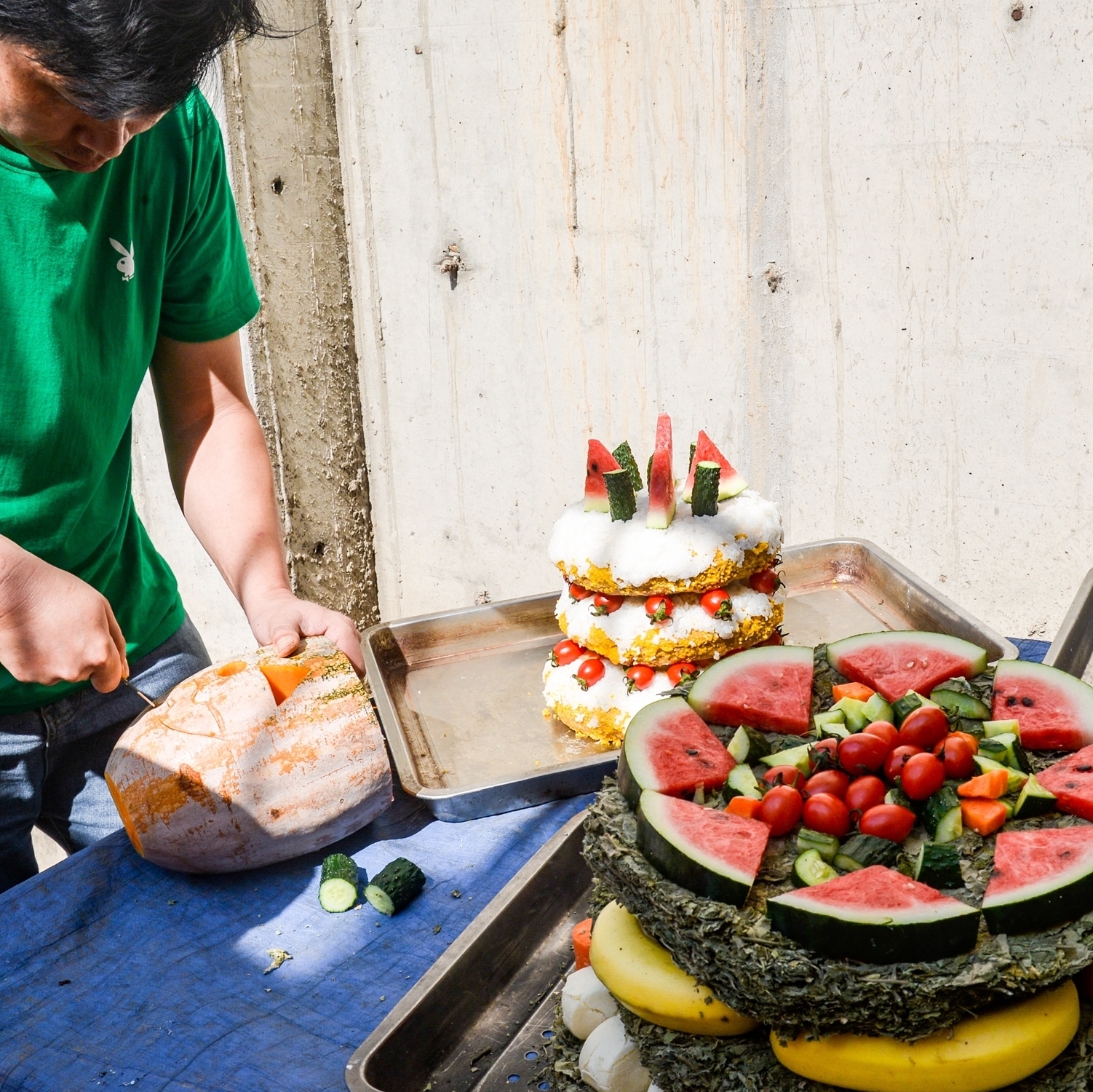Traditions are one of the ways in which we human beings shape our experience. They measure out time (when shall we get the Christmas tree), they dictate the menu (Daddy always makes mayonnaise at Easter), they even affect the cast (Dorothy always comes to stay on Good Friday), and they make us feel safe and secure because we have been able to repeat again something which we value. We feel that we are to some extent directing our own history; we create a family myth system.
Sometimes we borrow our traditions from society in general and sometimes we invent our own. Most family traditions are a combination of the two, so we have several around any particular religious or national festival (Christmas, obviously; Remembrance Sunday; birthdays). Any family is a melting pot where people have to negotiate over which of their previous family’s traditions they want to import, and it can be very difficult to give up a cherished one. On the other hand, not having to play parlour games at family Christmas parties is one of the things I am grateful to my husband for, because traditions can be onerous as well as reassuring. Striking a balance is key, because if you tried to fit two or more families’-worth of traditions into one long weekend, you’d end up exhausted. Using traditions to bully other people is not acceptable (look at the way forgetting or losing your poppy is now regarded as an act of extreme hostility); you can’t police traditions across families or society. But you can influence them inside your own family. Even if we don’t like the Christmas afternoon parlour games, we value the closeness they can bring, so we have to find a different way to create it.
Children enjoy traditions, as soon as they are old enough to understand them, but it’s very important for parents to stay one step ahead. This is because a tradition, once created and acknowledged, is set in stone, and woe betide the person who tries to alter it. So be sure, before you insist on everyone going out at dawn on Mayday to frolic charmingly in the dew, that this is how you actually want to spend your next twenty-plus Maydays. When the children were little, we used to line up (age-order, youngest first) outside the bedroom door of the Birthday Person before they were awake, and process in singing Happy Birthday. This was a slightly-altered version of my own family’s tradition, which had the Birthday Person hopping into bed next to a comatose mother, while my father organised the rest of us into the procession. It probably has its roots in Catholic primary school processions, but at least we didn’t have to wear veils at 6.45 a.m. As time has gone by, I have realised why my mother never really joined in until a bit later in the proceedings; the poor woman was trying to get a little more sleep and wake up a lot more gradually.
Traditions can appear spontaneously: a favourite walk on a particular day, an outing, a treat. For Mary’s birthday, we go by train to Hastings for the day (alas, not this year), just because we once did, and found it full of people dressed up as pirates; but it’s also useful to realise that you can create them deliberately, just as easily, and they can be really useful if you are a parent. Think of it as reinforcing desirable behaviour, and it can save a lot of hassle: when it’s time to go home from the playground, we do three more numbered slides (counting backwards, of course) down the slide, and then we have to go, because that’s what we do. This might seem like parental cheating, but after all, there are only so many hours in the day. After many years of going to bed excessively late on Christmas Eve and then having to get up excessively early because the children had found their stockings, I created a tradition that we only open a stocking once there is enough light to see without turning the light on. It works.
Food traditions tend to be important in families, and this is an area where the children are just as likely to declare an instant tradition as the grownups. We always have three particular stuffings with our Christmas turkey, and each one is essential. Peter thinks of exciting new ones he would like to try every now and again, but I take a lot of persuading to add anything to Christmas dinner, because if we end up with yet another stuffing, there won’t be enough room in the oven. As it is, I have to make two batches of each and hide all the second bowls or there won’t be any left to eat cold on Boxing Day, which they all adore; and I also have to hide the first bowls or he’ll start ‘just testing’ as soon as he gets home on Christmas Eve. He’s equally bad with the bread sauce, and I suppose it’s all part of the same tradition.
Everybody gets to choose their own birthday cake, which varies from year to year, but now instead of pirate ships, treasure chests or swimming pools, I get requests for Sachertorten or dark chocolate cake with coffee buttercream and chocolate buttons round the edge. So we’re getting (slightly) more sophisticated. The tradition is to have exactly what you want, rather than the same thing every year, and that seems to work.
Variation is not a problem, but it can be difficult if two people have very different memories of what the tradition is meant to be. Sometimes this leads to, or is rooted in, family teasing (we once had a cat which bit Rachel; she says it was on the ankle, but the others like to wind her up about it, and she did inadvertently sit on the cat when it was asleep on a black furry cushion). Often one member of a family is tacitly accepted as the person whose version is always the right one. This role of keeper of the family traditions could convey awesome power, or be a real burden.
Some traditions need props : particular decorations (Christmas); crucial bits of equipment (summer holidays and the special castle-building bucket). This is something you have to be very careful about if you live in more than one place. While we were living abroad, we alternated Christmas home and away (more or less), so eventually we ended up with a set of beloved tree decorations in both places. I will have to cull these at some point now that everything has come together (and there isn’t enough room to keep it all), but I’ll have to do it secretly and with crossed fingers. The one Christmas element which had to travel to and fro from year to year was the children’s stockings, because each of them has their own unique one. Thank God we never lost one; I can only imagine how noble everyone would have had to be about it. And we do carry a couple of spares for visitors. But I am still regularly reproached by the older children because we had to get rid of some cherished toys after a posting in Africa. I only threw out the ones which were being eaten by termites, but I still haven’t been forgiven.
As your children get bigger, it becomes clear which traditions are really not negotiable. Often it is the younger children who force the older ones to continue after the point when they might have let go, but at least this means that a tradition has a slow and painless death, once everyone is ready to move on. Birthday Processions were not negotiable, until the youngest went off to university. Now we have a different tradition, where we ring them up and sing very loudly down the phone. You get extra points if they are out with friends when they get the call. If they happen to be at home for a birthday, though, the option of a procession still has to be there. We have had four birthdays during lockdown. Only one was for one of the exiles, and John is devoutly glad that he is a January birthday, and already planning how to be off the premises and out of phone coverage somehow next year.
I wonder what new traditions will emerge after lockdown, in families and in the Church, and how many old ones will remain. It is worth thinking about them and at least making informed choices rather than just letting things happen. It would be a shame if we permanently lost holy water outside our churches, or the sign of peace, just because it was not allowed for so long, or if we decided only to use recordings rather than singing ourselves. Traditions (even instant ones) arise because people think they are valuable in their context. Perhaps we don’t give enough weight to the strength of feeling there may be in beloved familiarity and the comfort to be found in repeatedly doing things the same way; especially when so many other things seem to be changing around us. Change and decay in all around I see, O Thou who changest not, abide with me. Our traditions can change, but God, luckily, doesn’t.
Kate Keefe composes musical settings for the Mass and writes about the psalms. You can follow her on Facebook, Twitter and LinkedIn .



 Loading ...
Loading ...
What do you think?
You can post as a subscriber user ...
User comments (0)